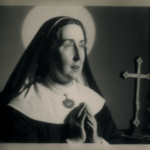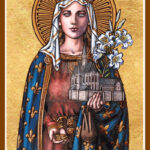St. Philip Neri
St. Philip Neri
St. Philip Neri: The Joyful Apostle of Rome
When they lived:
St. Philip Neri lived from July 22, 1515, to May 25, 1595.
Where they lived:
St. Philip Neri spent the majority of his life in the vibrant city of Rome, Italy.
Notable world events during the time of their life:
- The Council of Trent (1545 – 1563): One of the most significant events in the history of the Catholic Church, this ecumenical council addressed various issues and reforms within the Church, setting the foundations for the Counter-Reformation. St. Philip Neri played a crucial role in this period, promoting spiritual renewal and leading many to a deeper faith.
- The Age of Exploration (15th – 17th centuries): During St. Philip Neri’s life, the world witnessed a surge in exploration, with daring adventurers like Christopher Columbus and Ferdinand Magellan sailing the seas to discover new lands. This era of exploration brought about cultural exchanges, trade, and the expansion of knowledge and ideas.
- Galileo Galilei’s Discoveries (1564 – 1642): Galileo, a brilliant astronomer and mathematician, made groundbreaking discoveries during St. Philip Neri’s time. His observations using the telescope challenged existing beliefs about the cosmos and played a crucial role in advancing the scientific revolution.
- The Spanish Armada (1588): In 1588, the formidable Spanish Armada, an enormous fleet of ships, set sail to invade England. However, it faced defeat at the hands of the English fleet and adverse weather conditions. This event marked a turning point in European history and secured England’s position as a naval power.
- The Shakespearean Era (Late 16th – Early 17th centuries): St. Philip Neri’s life coincided with the flourishing of English literature, particularly the works of William Shakespeare. The Bard’s plays and poetry continue to influence the literary world and have left an enduring impact on the English language.
Patronage:
St. Philip Neri is the patron saint of joy, humor, and merrymaking. He is also considered the patron saint of Rome, where his cheerful and compassionate character endeared him to many, earning him the title “The Apostle of Rome.”
From the business of the world to the business of God
Philip Neri was born in Florence, Italy, on July 21, 1515. He was one of four children born to Francesco Neri, a notary. Philip’s mother died while they were very young. However, her place was filled by a capable stepmother. From infancy, Philip had a merry and docile disposition.
Philip received his early education from the Dominican friars in a monastery in Florence. When he was 18 years old, he went off to live with a wealthy relative in San Germano. His family hoped that he would become a successful businessman like his uncle. He assisted him there, and his family expected he could have possibly inherited the business.
However, soon after his arrival, Philip experienced a mystical vision. This event was an intense and personal encounter with Christ. It dramatically changed the course of his life. Soon, he lost interest in owning property or even participating in business and trade. He felt a call from the Holy Spirit to a life radically lived for and to serve the Lord and the Church.
A Champion of the Poor
Philip set out for Rome to study. He tutored young students to support himself at the university. During his first two years in Rome, Philip lived a solitary life. He practiced an ascetical way of life. During his free time, he visited the churches in Rome and the catacombs of many saints to pray. While he was praying in one of the catacombs, Philip suddenly realized what God wanted him to do with his life.
In 1535, Philip began studying theology and philosophy at the Sapienza and at St. Augustine’s monastery. Although he was considered a “promising scholar,” after three years of studies, Philip gave up any thought of ordination. Instead, Philip started to work among the poor and sick in Rome. In 1548, with the help of his confessor, Father Persiano Rossa, Philip founded a confraternity for poor laymen to meet for spiritual exercises and service of the poor, the Confraternity of the Most Holy Trinity, or the Oratory.
Philip and his contagious holiness
Philip had already accomplished so much, but his confessor, Father Persiano Rossa, was determined that his work would be more effective as a priest. This led him to decide to become a priest. On May 23, 1551, Philip was ordained to the priesthood. He talked about his ministry whenever he met someone new and urged people to join him. From there, Philip went to live with Father Rossa and other priests at San Girolamo and carried on his mission, mostly through the confessional.
Some people call Philip Neri the “saint maker”. This was because so many men came to Philip seeking advice and direction for living their faith. These men later became saints. Some of these men were St. Ignatius of Loyola, St. Francis de Sales, St. Charles Borromeo, and St. Francis Xavier. It is said that even popes and bishops came to the oratory to seek Philip’s advice.
When he was already old, after spending a day hearing confessions and receiving visitors, Philip Neri suffered a hemorrhage and died on the feast of Corpus Christi in 1595. Philip Neri was beatified by Pope Paul V on May 11, 1615, and canonized by Pope Gregory XV on March 12, 1622. His feast day is celebrated on May 26.
5 Interesting Facts About St. Philip Neri
- St. Philip Neri is the patron of joy and humor, Rome, and the US Army Special Forces.
- When he was young, St. Philip Neri was called “Pippo buono” or “good little Phil”. This was because he was a cheerful and attractive lad, popular with all who knew him.
- In 1544, on the eve of Pentecost, St. Philip Neri saw what appeared to be a globe of fire that entered his mouth, causing him to feel his heart dilate. Philip was engulfed with divine love that caused him to scream out, “Enough, enough, Lord, I can bear no more.” Philip then discovered a swelling over his heart, though it caused him no pain.
- St. Philip Neri once shaved half his beard just to bring smiles to children.
- A legend about him says that when the Pope wanted to make St. Philip Neri a cardinal, he hung a cardinal’s hat on Philip’s door. St. Philip took the hat and played catch with it, throwing it like a Frisbee, saying, “Don’t take yourself too seriously.”
Prayer to St. Philip Neri
O God, who never ceases to bestow the glory of holiness on the faithful servants you raise up for yourself,graciously grant that the Holy Spirit may kindle in us that fire with which he wonderfully filled the heart of Saint Philip Neri. Through our Lord Jesus Christ, your Son,who lives and reigns with you in the unity of the Holy Spirit,one God, for ever and ever Amen.



